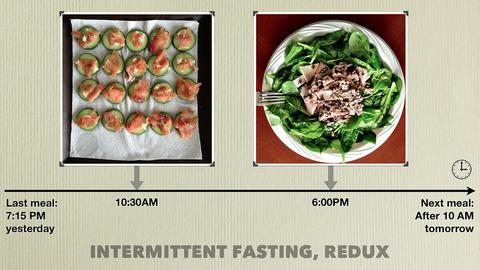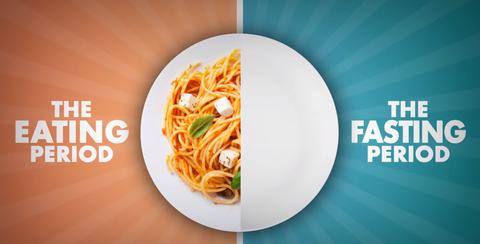6 Powerful Health Benefits Of Intermittent Fasting (Besides Weight Loss!)

If you’re someone who has been actively trying to lose weight or build muscle, chances are you’ve heard about intermittent fasting. Even though intermittent fasting is often touted as an extremely effective tool for weight loss, the truth is, the benefits of intermittent fasting go much deeper than just changing your body composition. And involve benefits for your brain, body, and overall well-being.
What Is Intermittent Fasting?

In a nut shell, intermittent fasting is going through periods of actively avoiding eating – usually in timed intervals. The great thing about intermittent fasting is that there’s a large variety of different ways you can go about it, making it easy to find a method of fasting that works for both your schedule and lifestyle.
The 16:8 fast
One of the most common forms of intermittent fasting is what’s called the 16:8. During the 16:8, someone will consolidate all of the calories they consume for the day into an 8-hour window, while consuming nothing but water, black coffee, and other 0 calorie beverages for the remaining 16 hours.
The 18:6 Fast
Another version of intermittent fasting is referred to as the 18:6 - which is what the bulletproof diet is based on. During the 18:6, someone will skip breakfast in the morning and replace their breakfast with coffee mixed with some type of fat like butter or coconut oil. Doing this allows the body to burn more fat throughout the day while simultaneously pushing the first meal back, allowing people to larger portions while consuming less total calories.
The Whole-Day Fast
An additional but less-popular version of intermittent fasting involves fasting for 1-2 days out of the week and then eating normally for the remainder of it. This would involve someone eating nothing for 24 hours (such as from 7pm on Tuesday to 7pm on Wednesday) and then continuing to eat their normal diet the remaining days of the week. Some people (who are trying to lose weight aggressively) will also mix the 16:8 with the whole-day fasts as well. It is important to keep in mind that before starting any type of fasting diet, it would be beneficial to consult a health professional to make sure you will be able to do it safely.
Intermittent Fasting And Weight Loss

Intermittent fasting is one of the most effective ways to lose weight because it involves periods and intervals of discipline as opposed to continual, 24/7 willpower. This makes it the preferred method of losing weight for a large number of people.
When someone who usually eats breakfast first begins intermittent fasting, they will notice that they will be hungry in the mornings. This is completely normal. After a period of about 9 days, the body will fully adjust to your newly-forged eating schedule and you will notice that you will no longer be hungry in the morning. The moment the body adapts to your new way of eating is the moment that losing weight becomes effortless, because you’ve just created a habit that is in line with your goals.
When you’re in the fasted state, your body drains itself of it’s glucose reserves, which is the stuff your body converts into energy from carbs. Without any glucose left in the body, your body will stop burning glucose and will then switch over to burning fat as fuel throughout the day. That is, until you eat more carbs. Then it will switch back to glucose. This switching over to running strictly off fats is one of the reasons intermittent fasting is so effective for dropping those pesky pounds.
But intermittent fasting is useful for so much more than just losing weight alone. Here are 6 powerful benefits of intermittent fasting that aren't about burning fat.
Intermittent Fasting Brain Health Benefits
As you get older, the effects of aging start taking a toll on your brain. Some of these effects include decreased blood flow, a shrinking of neurons and brain volume, and reduction of connective pathways between different parts of the brain. Intermittent fasting has been shown to slow down the rate at which these processes affect us, allowing us to ward off the effects of aging just a little bit longer. Intermittent fasting:
1) Improves memory
A 2009 study of 50 elderly adults found that three months of caloric restriction boosted their ability to recall words using only memory.
2) Puts Depression At Ease
Intermittent fasting can also help with mood disorders such as depression. A study conducted in 2013 found that depressed people who underwent some type of fasting regiment reported improvements in their mood, peace of mind, and overall mental alertness.
3) Protects Neurons From Degeneration
Intermittent fasting helps protect cells from unnecessary degeneration. One of the reasons why it does this is because when the body enters a fasted state, it prefers to use damaged cells over healthy cells so it can cleanse the body of any harmful free radicals that may be floating around in the bloodstream. This process is known as autophagy and is essential in preventing chronic diseases and keeping your immune system working efficiently. A study conducted in 2003 found that intermittent fasting aided in the process of guarding neurons from excitoxic stress (also known as neural death).
Intermittent Fasting Longevity Benefits

Although fasting has been used as a longevity tool by humans for thousands of years, it has only been within the last few decades that scientific research has been conducted on the relationship between fasting and longevity. Here are a few benefits that intermittent fasting has in regards to overall health and longevity.
4) Slows Down Growth Of Tumor Cells
When utilized with chemotherapy procedures, intermittent fasting has the potential to reduce the speed and growth of tumors in patients experiencing both breast cancer and skin cancer. It does this by increasing the number of lymphocytes in the body. Lymphocytes are cells that the body sends to combat the growth of tumors inside of the body.
5) Lowers Cholesterol
Studies have shown that adhering to a regular fasting schedule can reduce a number of different risk markers when it comes to health. A 2010 study of overweight women concluded that intermittent fasting reduced insulin resistance, lowered both blood pressure and cholesterol, and improved a variety of markers that are measured in the progression of chronic disease.
6) Keeps Your Cells Strong
A 2017 study from Harvard University found that regular fasting helped keep mitochondrial networks working together effectively. As the primary driver of energy in the body, properly-functioning mitochondrial networks are essential for feeling energetic and aging effeciently.
Along with being an excellent resource for losing weight, gaining muscle, and adjusting your all-around body composition, intermittent fasting has powerful health benefits that aren’t strictly aesthetic-related. From maintaining a healthy brain to keeping your cells strong and youthful, intermittent fasting is a fantastic tool that can be included in virtually anybody’s diet, and adjusted as necessary to meet your specific needs.







